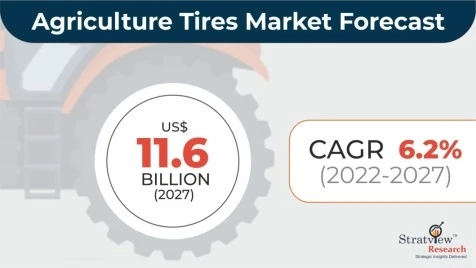The Agriculture Tires Market is segmented by Application Type (Tractors, Harvesters, and Others), Tire Type (Radial Tires and Bias Tires), End-User Type (OE and Aftermarket), and Region (North America [The USA, Canada, and Mexico], Europe [Germany, France, The UK, Turkey, Russia, and Rest of Europe], Asia-Pacific [China, Japan, India, and Rest of Asia-Pacific], and Rest of the World [Brazil, South Africa, and Others]).
Agriculture Tires Market: Meeting the Demands of Modern Agriculture
The Agriculture Tires market plays a pivotal role in meeting the evolving demands of modern agriculture, where efficiency, productivity, and sustainability are paramount. As the global population continues to rise, the pressure on the agriculture industry to produce more food and meet growing demands increases. In this scenario, the choice of the right tires becomes crucial for farmers to optimize their operations and enhance overall productivity.
Modern agriculture is characterized by larger and more powerful machinery that requires robust and high-performing tires. Agriculture tires are specially designed to withstand heavy loads, challenging terrains, and adverse weather conditions. The market offers a wide variety of tire options, including radial tires, bias tires, and flotation tires, tailored to different farming needs and equipment specifications.
The agriculture tires market also focuses on sustainable practices to reduce soil compaction, fuel consumption, and carbon emissions. Low-pressure tires and flotation tires help minimize soil disturbance and improve crop yields. Additionally, the adoption of precision agriculture technologies is driving the demand for agriculture tires with advanced tread designs and enhanced traction, ensuring precise and efficient operations in the field.
Furthermore, tire manufacturers are increasingly investing in research and development to create more durable and eco-friendly tire solutions. Innovative materials and designs are being incorporated to extend tire life, reduce waste, and promote recycling.
In conclusion, the Agriculture Tires market plays a crucial role in supporting modern agriculture by meeting the demands of farmers for enhanced efficiency and productivity. As the agriculture industry continues to evolve, the market will keep innovating to provide tire solutions that optimize farming practices, reduce environmental impact, and contribute to sustainable agricultural practices for the future. With a focus on precision, durability, and sustainability, agriculture tires are paving the way for a more productive and sustainable future in farming.


